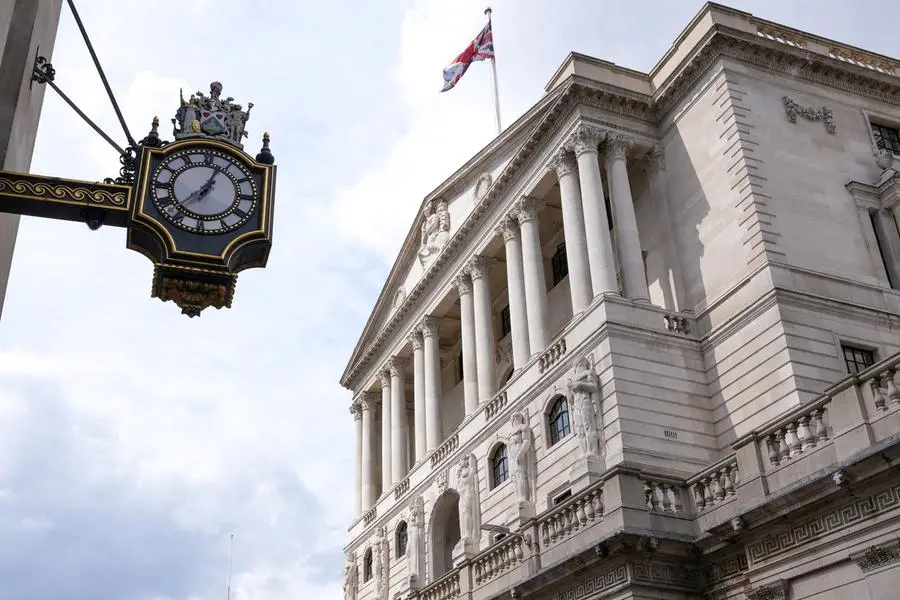PHOTO
Britain's pensions industry, Europe's biggest, is posing a new challenge to the country's 2 trillion pound ($2.5 trillion) government bond market a year on from the "mini-budget" crisis that put the sector at the centre of financial stability fears.
Pension funds are big buyers of UK debt, known as gilts, but they are likely to step back just as the Bank of England (BoE) reduces its own holdings faster and debt issuance remains high, adding pressure on British borrowing costs.
Benefiting from the highest interest rates since 2008, pension funds are better funded to meet future payouts than they have been in years.
To take advantage of this strength, funds are rushing to purchase bulk annuity policies from insurers, to whom they transfer pension liabilities along with some assets, reducing balance sheet uncertainty.
Because insurers hold a lot less government debt than pension funds, favouring higher-return assets such as corporate debt, they are expected to sell some of the gilts they receive.
Big asset managers have turned positive on gilts recently, lured in by high yields and confidence that inflation is finally easing.
Yet the notion that pension funds, who along with insurers hold a quarter of outstanding gilts, may step back, is unsettling a year after a rout in gilts saw pension funds dump UK bonds in fire sales to meet collateral calls from Liability-Driven Investment (LDI) funds.
"Pension fund appetite for gilts was obviously questioned during that LDI episode," said Chris Jeffery, head of rates and inflation strategy at Legal and General Investment Management.
"It's unclear the extent to which that will ever go back to what it was."
NEW TREND
The deals between pensions funds and insurers -- buy-outs and buy-ins -- reached a record 20.2 billion pounds in the first half of 2023, estimate pension consultants Lane Clark & Peacock, who expect a surge to 45 billion pounds this year and as much as 600 billion pounds over the next decade.
"There's a net sale of gilts for every buyout that happens," said Barry Kenneth, chief investment officer of the Pension Protection Fund, which protects corporate pensioners.
The scale of gilt selling by insurers that could result will depend on interest rates and insurers' capacity to take on pension liabilities. But investors say it shouldn't be underestimated.
While pension funds hold roughly 50% of their assets in gilts, insurers only hold 15%, Van Lanschot Kempen Investment Management estimates based on funds it has studied this year.
It expects insurers to sell 100 to 150 billion pounds of the gilts they take over from pension funds in the coming years.
"That's a significant number that will be flowing out of the gilt market," head of client advice Arif Saad said.
"KEY CONCERN"
Pension funds couldn't step back at a worse time given Britain's high funding needs and weakening economy.
It is selling 240 billion pounds of debt this year, a record, save for 2020-21. The amount private buyers need to buy will remain elevated for years as interest payments rise and the BoE, its biggest creditor holding 30% of its debt, decided on Thursday to reduce its holdings faster, by 100 billion pounds over the next year.
Craig Inches, head of rates and cash at Royal London Asset Management, called simultaneous sales of pension fund and BoE gilt holdings "a key concern" for Britain's debt management agency.
Investors already see signs of their dwindling demand raising borrowing costs, one being a recent rise in longer-dated yields relative to shorter ones.
"Historically UK defined benefit pension schemes have been one of the material buyers of long-dated UK government bonds. We're seeing their appetite has materially diminished versus years gone by," said Owen Davies, LDI solutions manager at Schroders, citing anticipation of transfers to insurers as a key reason.
A spokesperson said Britain's debt agency was well aware of the pensions transfers and their potential to impact gilt demand, but expects pension funds and insurers to remain a "very important" investor base, continuing to show strong demand for longer-dated gilts.
Maintaining its diversified investor base will continue to ensure a reduction in demand from one sector doesn't inhibit funding ability and market liquidity, the spokesperson added.
The BoE, which monitors market conditions closely, declined to comment.
Helped by the pension fund demand of past years, Britain's average debt life is around 15 years, more than double the U.S. and Germany's.
Britain has already started skewing its funding towards shorter debt this year, citing high borrowing needs, a move investors reckon also reflects declining pension fund appetite.
"It's going to take a long time... to ship the supertanker of the debt stock from where it is today to align it more closely with global norms," LGIM's Jeffery said.
(Reporting by Yoruk Bahceli in Amsterdam and Carolyn Cohn in London; editing by Dhara Ranasinghe and Toby Chopra)





















